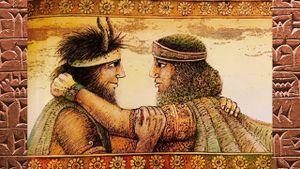Gilgamesh Redux
This week, I taught the epic of Gilgamesh. At the center of this, one of humanity’s oldest stories, we have Gilgamesh’s quest for his humanity. The irony is that in order for him to find it, he had to encounter death first. Only through losing his best friend Enkidu was Gilgamesh able to acquire the humility he needed to be a good leader to his people and the “heart of Uruk” by the time of his own death.

Lack of permanence is a dominant theme throughout. This is a difficult lesson, particularly for a hero who has more to lose. Truly, it’s only by negating the Ego are we able to face death and life.
Notice, too, the ecological themes. There is a delicate balance between the needs of a growing civilization and that of nature that allows us to live. Nature is threatening and dangerous, but it’s also necessary if we want to live. We must find a balance, something we still struggle with today. Death, too, is part of nature. Though we crawled out of it, nature is something that, at times, seems antithetical to humanity. It wasn’t Gilgamesh’s fate to escape nature’s effects, yet we seem to still have a collective yearning as a species to somehow transcend nature, including entropy and death. Religion does it for some; perhaps technology will do it for others.
Yet, the story of the flood shows us not to be too loud in our desires. Nature always seems to have a way of deflating our hubris. The gods in Gilgamesh seem more aligned to nature, sometimes deciding to press the reset button. People today talk about saving the planet by being careful what we do to our environment. I agree that we should be more harmonious with nature, but while our actions seem to be destroying the planet, it’s really ourselves that will suffer from our lack of foresight. The planet will be fine when that reset button is pressed. It’s us that seem doomed to be a footnote in history.
